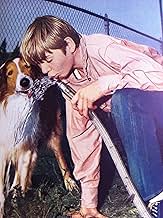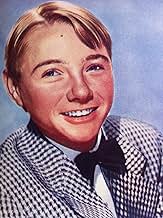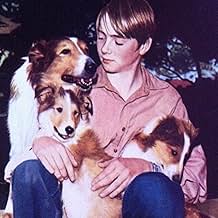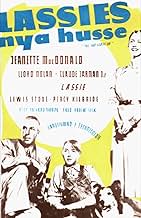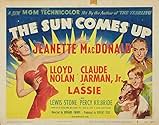VALUTAZIONE IMDb
6,4/10
493
LA TUA VALUTAZIONE
Aggiungi una trama nella tua linguaSet in the rural south of the United States, a bereaved war widow learns to to put aside her bitterness and grief as she grows to love a young orphan boy and the dog that belonged to her lat... Leggi tuttoSet in the rural south of the United States, a bereaved war widow learns to to put aside her bitterness and grief as she grows to love a young orphan boy and the dog that belonged to her late son. Punctuated with song-filled interludes.Set in the rural south of the United States, a bereaved war widow learns to to put aside her bitterness and grief as she grows to love a young orphan boy and the dog that belonged to her late son. Punctuated with song-filled interludes.
- Regia
- Sceneggiatura
- Star
Ed Agresti
- Musician
- (non citato nei titoli originali)
Jessie Arnold
- Townswoman at Fire
- (non citato nei titoli originali)
Charles Bates
- Orphan
- (non citato nei titoli originali)
Bobby Beyers
- Orphan
- (non citato nei titoli originali)
Barbara Billingsley
- Nurse
- (non citato nei titoli originali)
Paul E. Burns
- Dr. Sample
- (non citato nei titoli originali)
John Butler
- Hotel Attendant
- (non citato nei titoli originali)
Recensioni in evidenza
Though she didn't intend The Sun Comes Up to be her final film, it turned out that way for Jeanette MacDonald. In this movie she plays, what else, a concert singer who is a war widow. After a few years of devoting herself to raising her only son, Dwayne Hickman, MacDonald is encouraged by her manager Lewis Stone to go back to the concert stage.
She goes back and becomes a great success in her comeback. But after the concert she sees her son run down by a truck as he was trying to save their collie Lassie from the same fate.
That just about destroys her and who could blame her for wanting to get away from it all. She rents an unused house deep in the Appalachians in North Carolina that's owned by Lloyd Nolan. She and Lassie go to live there and get involved with a group of kids from the county orphanage. Especially one young man, Claude Jarman, Jr., who reminds her of her late son.
Jeanette gets some good opera and concert material to sing, items that were staples in her real concerts. The highlights for me are Un Bel Di from Madame Butterfly and Romance.
And she gets her most cooperative co-star ever in Lassie. The beloved collie pulls off quite a rescue in the climax, but didn't steal any scenes from Jeanette MacDonald.
She never planned that The Sun Comes Up would be her last film. She had a lot of ambitions to return to the screen. During the Fifties she did The King and I in summer stock and hoped to be cast in the film adaption as Anna Leonowens. I think the part would have suited her perfectly and she wouldn't have to have been dubbed as Deborah Kerr was.
And one part she really wanted was as the Mother Abbess in The Sound of Music. She loved the song Climb Every Mountain. But by the time the film version of Sound of Music was being cast, Jeanette's health was failing.
Still The Sun Comes Up is a fine family film and a fitting end for a screen legend.
She goes back and becomes a great success in her comeback. But after the concert she sees her son run down by a truck as he was trying to save their collie Lassie from the same fate.
That just about destroys her and who could blame her for wanting to get away from it all. She rents an unused house deep in the Appalachians in North Carolina that's owned by Lloyd Nolan. She and Lassie go to live there and get involved with a group of kids from the county orphanage. Especially one young man, Claude Jarman, Jr., who reminds her of her late son.
Jeanette gets some good opera and concert material to sing, items that were staples in her real concerts. The highlights for me are Un Bel Di from Madame Butterfly and Romance.
And she gets her most cooperative co-star ever in Lassie. The beloved collie pulls off quite a rescue in the climax, but didn't steal any scenes from Jeanette MacDonald.
She never planned that The Sun Comes Up would be her last film. She had a lot of ambitions to return to the screen. During the Fifties she did The King and I in summer stock and hoped to be cast in the film adaption as Anna Leonowens. I think the part would have suited her perfectly and she wouldn't have to have been dubbed as Deborah Kerr was.
And one part she really wanted was as the Mother Abbess in The Sound of Music. She loved the song Climb Every Mountain. But by the time the film version of Sound of Music was being cast, Jeanette's health was failing.
Still The Sun Comes Up is a fine family film and a fitting end for a screen legend.
THE SUN COMES UP (Metro-Goldwyn-Mayer, 1948), directed by Richard Thorpe, is a sentimental drama notable for being both movie featuring the famous collie by the name of Lassie, introduced five years earlier in LASSIE COME HOME (MGM, 1943), and the final movie appearance of opera singer/actress, Jeanette MacDonald. MacDonald has come a long way in movies by this point, making her film debut in THE LOVE PARADE (Paramount, 1929), starring Maurice Chevalier, with whom she teamed in three more musical-comedies. Aside from non-musical works for other studios such as Fox, she found both home and success at MGM starting in 1934, where the studio developed her talents more towards opera, with a new screen partner being Nelson Eddy. By the 1940s, her style of movies began to wane, marking the close for MGM by 1942. In 1948, she returned to the screen, and MGM, this time playing singing-mother roles starting with THREE DARING DAUGHTERS. Whether MacDonald intended on ending her movie career or not with THE SUN COMES UP is uncertain. At least she managed to hold her own against her scene stealing co-stars, especially from the dog named Lassie.
Plot summary: Helen Lorfield Winter (Jeanette MacDonald) is a widowed mother with a teenage son, Hank (Dwayne Hickman) with a collie, Lassie, who adores him. Since the death of her husband, Helen has devoted her time towards her family and home life. A former opera singer by profession, and through the assistance of her manager, Arthur Norton (Lewis Stone), Helen gets her new beginning returning to concert singing for the first time in three years. Her concert proves successful, but her happiness is shattered by the sudden death of her son after getting struck by a passing truck while trying to prevent Lassie from getting hit while on the street. Weeks pass. Helen gives up her career. Unable to be around people, especially children, Helen packs up her belongings to go someplace far away to forget. Though she blames Lassie for her son's death, she takes Lassie with her anyway on a car trip leading her to Bushy Gap, a hillbilly residence located somewhere in the mountains. Helen's new beginning restarts as she rents a furnished home belonging to the out-of-town, Thomas I. Chandler. She soon finds herself disliked by town folks through her attitude towards their children. Through the kindly but blunt assistance of storekeeper, William B. Willigoode (Percy Kilbride), who tells her the truth about herself, Helen's attitude soon changes, especially after meeting with a teenage boy named Jerry (Claude Jarman Jr.). After saving Lassie from a rattlesnake, Helen hires Jerry as her handyboy. Though fond of Jerry, she knows very little about him. It takes her landlord, Thomas Chandler (Lloyd Nolan), having returned from his trip, to let her figure things out for herself. Others in the cast include: Hope Landin (Mrs. Pope); Nicholas Joy (Victor Alvord); Mickey McGuire (Cleaver) and Teddy Infuhr (Junebug).
Not the typical MacDonald movie from the past, THE SUN COMES UP, actually resembles that of an episode from a "Lassie" television series a decade later. Though second billed, Lloyd Nolan comes in 63 minutes into the start of the movie, while Claude Jarman Jr., best known for his performance in THE YEARLING (MGM, 1946), takes up much of the proceedings playing a likable harmonica teenager who bonds well with Lassie. Being more drama than musical, the presence of comical types as Percy Kilbride, Margaret Hamilton and Ida Moore, highlight greatly to its lighter moment. Even MacDonald does a brief comedy turn for one scene involving snuff. Because of MacDonald's reputation as a singer, song numbers are inserted into the story, including: "Un Bel De Vedremo" from Giacomo Puccini's MADAME BUTTERFLY; "Songs My Mother Taught Me" by Antonin Dvorak; Rene Rabey's "Tes Jolies Yeux" "Cousin Ebenezer" (with MacDonald and group of orphan boys); and "If You Were Mine" by Artur Rubenstein.
THE SUN COMES UP may not be a MacDonald favorite for anyone in favor of her singing opposite Nelson Eddy in eight musicals from 1935 to 1942, or working opposite Clark Gable and Spencer Tracy in SAN FRANCISCO (MGM, 1936), but it is satisfactory screen entertainment of MGM's 93 minutes of Technicolor family style mode. Formerly available on video cassette and later on DVD, THE SUN COMES UP, can often be found on the Turner Classic Movies cable channel. (**1/2)
Plot summary: Helen Lorfield Winter (Jeanette MacDonald) is a widowed mother with a teenage son, Hank (Dwayne Hickman) with a collie, Lassie, who adores him. Since the death of her husband, Helen has devoted her time towards her family and home life. A former opera singer by profession, and through the assistance of her manager, Arthur Norton (Lewis Stone), Helen gets her new beginning returning to concert singing for the first time in three years. Her concert proves successful, but her happiness is shattered by the sudden death of her son after getting struck by a passing truck while trying to prevent Lassie from getting hit while on the street. Weeks pass. Helen gives up her career. Unable to be around people, especially children, Helen packs up her belongings to go someplace far away to forget. Though she blames Lassie for her son's death, she takes Lassie with her anyway on a car trip leading her to Bushy Gap, a hillbilly residence located somewhere in the mountains. Helen's new beginning restarts as she rents a furnished home belonging to the out-of-town, Thomas I. Chandler. She soon finds herself disliked by town folks through her attitude towards their children. Through the kindly but blunt assistance of storekeeper, William B. Willigoode (Percy Kilbride), who tells her the truth about herself, Helen's attitude soon changes, especially after meeting with a teenage boy named Jerry (Claude Jarman Jr.). After saving Lassie from a rattlesnake, Helen hires Jerry as her handyboy. Though fond of Jerry, she knows very little about him. It takes her landlord, Thomas Chandler (Lloyd Nolan), having returned from his trip, to let her figure things out for herself. Others in the cast include: Hope Landin (Mrs. Pope); Nicholas Joy (Victor Alvord); Mickey McGuire (Cleaver) and Teddy Infuhr (Junebug).
Not the typical MacDonald movie from the past, THE SUN COMES UP, actually resembles that of an episode from a "Lassie" television series a decade later. Though second billed, Lloyd Nolan comes in 63 minutes into the start of the movie, while Claude Jarman Jr., best known for his performance in THE YEARLING (MGM, 1946), takes up much of the proceedings playing a likable harmonica teenager who bonds well with Lassie. Being more drama than musical, the presence of comical types as Percy Kilbride, Margaret Hamilton and Ida Moore, highlight greatly to its lighter moment. Even MacDonald does a brief comedy turn for one scene involving snuff. Because of MacDonald's reputation as a singer, song numbers are inserted into the story, including: "Un Bel De Vedremo" from Giacomo Puccini's MADAME BUTTERFLY; "Songs My Mother Taught Me" by Antonin Dvorak; Rene Rabey's "Tes Jolies Yeux" "Cousin Ebenezer" (with MacDonald and group of orphan boys); and "If You Were Mine" by Artur Rubenstein.
THE SUN COMES UP may not be a MacDonald favorite for anyone in favor of her singing opposite Nelson Eddy in eight musicals from 1935 to 1942, or working opposite Clark Gable and Spencer Tracy in SAN FRANCISCO (MGM, 1936), but it is satisfactory screen entertainment of MGM's 93 minutes of Technicolor family style mode. Formerly available on video cassette and later on DVD, THE SUN COMES UP, can often be found on the Turner Classic Movies cable channel. (**1/2)
This film was Jeanette MacDonald's last film. And, considering it's a nice little family movie, she went out in style.
Helen is distraught. Her son has just died and she has decided to retreat to the countryside to try to forget. This is made tougher because the boy's dog refuses to leave her and she reluctantly takes the dog along with her. Through the course of the movie, Helen becomes friends with an orphan boy, Jerry (Claude Jarmin Jr.) and the woman who wants to be alone and forget soon learns to live again.
This film is less a Lassie film than most. Sure, the dog's important to the story...but the humans are more important and he's more a supporting player. Overall, very engaging and a nice story that you are sure to enjoy....and made with the usual MGM style and flair.
Helen is distraught. Her son has just died and she has decided to retreat to the countryside to try to forget. This is made tougher because the boy's dog refuses to leave her and she reluctantly takes the dog along with her. Through the course of the movie, Helen becomes friends with an orphan boy, Jerry (Claude Jarmin Jr.) and the woman who wants to be alone and forget soon learns to live again.
This film is less a Lassie film than most. Sure, the dog's important to the story...but the humans are more important and he's more a supporting player. Overall, very engaging and a nice story that you are sure to enjoy....and made with the usual MGM style and flair.
They just don't make them like this anymore. I really liked this old movie. A movie of love and loss and moving on. The setting is great a place in the mountains. Wonderful main characters and supporting characters that make up the quirky country folk. This movie tugs at your heart strings. Wonderful performances by Jeanette MacDonald, Percy Kilbride and Claude Jarman Jr, not to mention Lassie! I wish there were more wholesome films like this. These old movies stand on their own without digitalized effects and profanity so common to new Hollywood. Jeanette MacDonald had such a beautiful voice. Give me non-enhanced sentimental movies any day! Put on your pjs and grab the popcorn and Kleenex this is a great movie for a rainy day when you don't want over the top action.
Jeanette MacDonald stars as a widowed concert singer who suffers another disaster and yearns to retire from the world. She loads up her nifty wood-paneled convertible (a Plymouth?) and dog (Lassie) and sets out. She finds a house in the mountains of a small Southern town and settles in. But she's never runs a household before and discovers she must do her own household chores, cooking, etc. This puts her into contact with the comical-but-wise town grocer (Percy Kilbride) and some other locals. Most annoying, however, is the boy Kilbride has sent to do chores. The boy and dog instantly bond. Slowly, MacDonald gets back her hold on her life, learns to love the boy (Claude Jarman) and return to her own world. But she'll never be the same.
Full of funny moments and a few that will tug your heart strings, this is a nice old-fashioned film and well done by all involved. The Technicolor is also beautiful.
MacDonald, in her final film appearance, looks great and turns in a terrific performance as the woman who learns to love again. She also sings a few songs, including a beautiful rendition of "Un Bel di Vedremo" from MADAMA BUTTERFLY. Kilbride is hilarious as is Margaret Hamilton as the nosy spinster. Jarman is solid in a role that could have been cloying. Others include Lloyd Nolan, Lewis Stone, Ida Moore, Dwayne Hickman, Hope Landin, and Barbara Billingsley.
What a shame the great MacDonald never found another film vehicle. Voice aside, she was a marvelous actress with a great sense of comic timing. Her final film doesn't rank with her unforgettable films with Nelson Eddy, but it's a fine and memorable film in its own right.
Full of funny moments and a few that will tug your heart strings, this is a nice old-fashioned film and well done by all involved. The Technicolor is also beautiful.
MacDonald, in her final film appearance, looks great and turns in a terrific performance as the woman who learns to love again. She also sings a few songs, including a beautiful rendition of "Un Bel di Vedremo" from MADAMA BUTTERFLY. Kilbride is hilarious as is Margaret Hamilton as the nosy spinster. Jarman is solid in a role that could have been cloying. Others include Lloyd Nolan, Lewis Stone, Ida Moore, Dwayne Hickman, Hope Landin, and Barbara Billingsley.
What a shame the great MacDonald never found another film vehicle. Voice aside, she was a marvelous actress with a great sense of comic timing. Her final film doesn't rank with her unforgettable films with Nelson Eddy, but it's a fine and memorable film in its own right.
Lo sapevi?
- QuizPrimavera di sole (1949) is mainly based on the 1936 short story "A Mother in Mannville" by Marjorie Kinnan Rawlings. According to the University of South Carolina Libraries description of Rawlings' works, in 1946 MGM asked Rawlings to do a story that could star Lassie with Claude Jarman Jr.. Rawlings started with her 1936 short story "A Mother in Mannville." MGM bought the rights to Rawlings' unpublished story "A Family for Jock," re-titled it "Mountain Prelude," and sold the literary rights to The Saturday Evening Post. The story appeared The Post as a six-part serial during April 26 to May 31, 1947. But it has never been published in novel form.
- BlooperWhen Jerry finally decides to go play with Lassie, we can hear someone off-screen give Lassie a command. Right after Jerry says,"Let's have fun now," and hugs Lassie, a man's voice clearly speaks a word off-camera, and Lassie looks in that direction before running off with the boy.
- Colonne sonoreUn Bel Di
(uncredited)
from "Madama Butterfly"
Music by Giacomo Puccini
Libretto by Luigi Illica and Giuseppe Giacosa
Sung by Jeanette MacDonald
I più visti
Accedi per valutare e creare un elenco di titoli salvati per ottenere consigli personalizzati
- Is "The Sun Comes Up" based on a book?
- How does the movie end?
Dettagli
- Tempo di esecuzione1 ora 33 minuti
- Proporzioni
- 1.37 : 1
Contribuisci a questa pagina
Suggerisci una modifica o aggiungi i contenuti mancanti

Divario superiore
By what name was Primavera di sole (1949) officially released in India in English?
Rispondi

